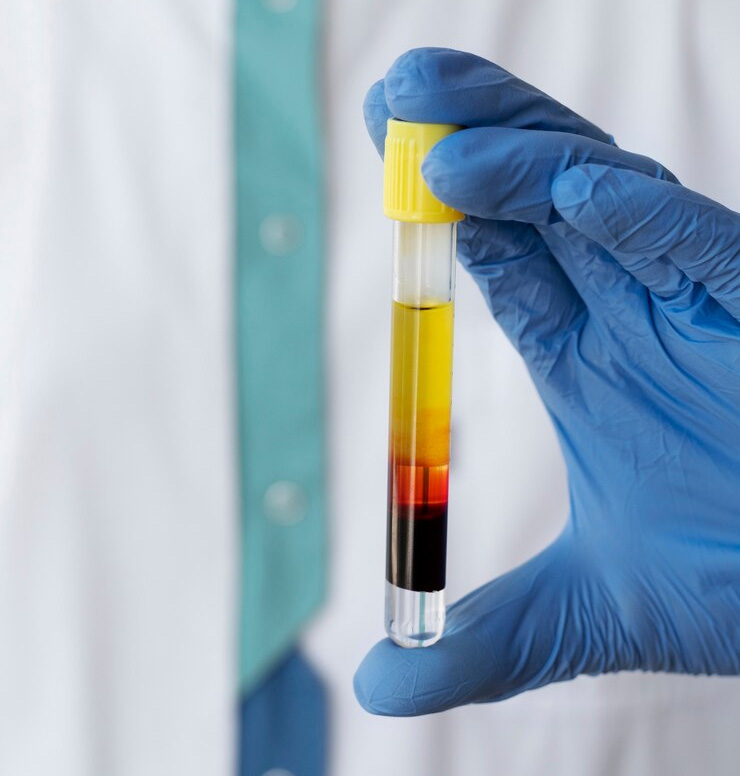Endometrial PRP
Repairs endometrial tissue
Promotes implantation in the uterus

What does endometrial PRP repair?
Treatment with platelet-rich plasma, or endometrial PRP, makes it possible to regenerate and repair endometrial tissue with the patient’s own plasma.
Would you like us to study your case?
This cellular regeneration encourages a more receptive uterine environment for embryo implantation, increasing the success rate of IVF.
A solution for implantation failure
When repeated implantation failures occur, despite the transfer of good quality and chromosomally normal embryos, Tambre will try to find the cause and possible solution to this frustrating situation.
We may be dealing with a case of “refractory endometrium“, i.e. when the lining of the uterus does not respond adequately to the hormonal signals necessary for embryo implantation.
The reasons for the endometrium not being receptive can be hormonal imbalances, chronic inflammation of the endometrium, uterine abnormalities, infections, and immune system disorders, among others.
In these cases, endometrial PRP, also called platelet-rich plasma, has shown positive results in improving endometrial receptivity by regenerating damaged endometrial tissue.
What is endometrial PRP?
Endometrial PRP is a therapy that involves the application of platelet-rich plasma directly into the endometrium, which is the inner lining of the uterus.
Platelets are cells present in the blood. They are responsible for blood clotting and also for the production of Platelet Growth Factors, which are necessary for the regeneration of various tissues.
PRP is obtained from the patient’s own blood, which goes through a process called centrifugation to separate and concentrate the platelets and growth factors. These growth factors can stimulate cell regeneration, promote vascularisation and reduce endometrial inflammation.
Endometrial PRP is usually applied by direct placement into the uterus through a catheter. Once inside the uterus, the PRP is distributed over the surface of the endometrium. It then begins to regenerate the endometrial tissue, repairing its structure and function.
In addition, endometrial PRP produces an immunomodulatory action, i.e. it reduces inflammatory processes and improves the condition of the endometrium, in preparation for embryo transfer.
When is endometrial PRP suitable?
Endometrial PRP is suitable in situations where endometrial receptivity needs to be improved. The main ones are refractory endometrium and Asherman's disease. It might also be used in case of recurrent implantation failure and other situations.
When the endometrium does not respond adequately to the hormonal signals necessary for embryo implantation. We consider it to be a refractory endometrium when it does not reach 6mm, with different protocols and with adjuvant treatments such as ASA (Aspirin®) or sildenafil (Viagra®).
This is a condition in which scarring or adhesions form within the uterus. Growth factors can stimulate repair and the restoration of the endometrium.
Women who have experienced multiple implantation failures with optimal blastocyst transfers.
When endometrial tissue grows into the muscular wall of the uterus, endometrial PRP may help reduce inflammation.



If, after several IVF attempts, there have been no successful results, Tambre’s medical team will assess whether endometrial PRP is suitable for each individual case.
The first step in obtaining PRP is to draw the woman’s blood, in the same way as blood tests are carried out. Therefore, obtaining platelet-rich plasma is not a great inconvenience for the patient.
The blood sample is taken to our laboratory and placed in a centrifuge to separate the blood components. Centrifugation separates the platelets and other important components from the blood plasma. Once separated, the platelets and other growth factors are mixed with a small amount of blood plasma to create a platelet-rich plasma concentrate.
PRP is applied directly into the endometrium in the days before the embryo transfer. It is performed using a very fine catheter placed in the uterus and guided by ultrasound. It is, therefore, a painless process that does not require anaesthesia.
Depending on the patient’s pathology and the endometrial thickness that has been achieved, the number of doses that need to be administered before the embryo transfer will be assessed. On average, three injections are performed, 5-7 days before the transfer.
Phases of endometrial PRP treatment
To apply platelet-rich plasma, the process is as follows:
If, after several IVF attempts, there have been no successful results, Tambre’s medical team will assess whether endometrial PRP is suitable for each individual case.
The first step in obtaining PRP is to draw the woman’s blood, in the same way as blood tests are carried out. Therefore, obtaining platelet-rich plasma is not a great inconvenience for the patient.
The blood sample is taken to our laboratory and placed in a centrifuge to separate the blood components. Centrifugation separates the platelets and other important components from the blood plasma. Once separated, the platelets and other growth factors are mixed with a small amount of blood plasma to create a platelet-rich plasma concentrate.
PRP is applied directly into the endometrium in the days before the embryo transfer. It is performed using a very fine catheter placed in the uterus and guided by ultrasound. It is, therefore, a painless process that does not require anaesthesia.
Depending on the patient’s pathology and the endometrial thickness that has been achieved, the number of doses that need to be administered before the embryo transfer will be assessed. On average, three injections are performed, 5-7 days before the transfer.
Endometrial PRP: a safe and effective treatment

EFFECTIVE
Endometrial PRP has shown benefits in improving the thickness and receptivity of the endometrium, which may increase implantation and pregnancy rates.

SIMPLE
The process of obtaining the PRP is quick and simple, lasting approximately 20 minutes, and is performed directly in the clinic by trained healthcare staff.

SAFE
As it is a treatment with autologous plasma, obtained directly from the patient, endometrial PRP does not produce side effects as is the case with other treatments.

PAINLESS
The simplicity of the technique means that, excluding the initial blood collection, the rest of the treatment is painless and uncomplicated.
Improves endometrial receptivity
Endometrial PRP improves endometrial receptivity and increases the chances of success in IVF treatments.
Specialists in Advanced Reproductive Medicine
We are pioneers in assisted reproduction in Spain and Europe.
45 years of medical excellence.
We design tailor-made treatments.
- State-of-the-art assisted reproduction laboratory.
- Our own andrology laboratory.
- RI Witness™ for the safety and traceability of gametes.
- GERI®: Embryo Incubator®.
- Fenomatch, we find the right egg donor and/or sperm donor and match them with you.
- Zymot-ICSI (Chip Fertile), selection of the best sperm before ICSI.
- You will have your own gynaecologist and nurse, except for emergencies, and the same medical team will follow your case in depth and attend you from the beginning to the end of the treatment.
- You will have a consultant from our Specialised Tambre Care team who will support you and answer any question you may have throughout the whole process.

We stay with you
Our support team is always at your side for whatever you need
Shall we call you?
Our support team is always at your side for whatever you need
Or send us an email to atpaciente@clinicatambre.com








